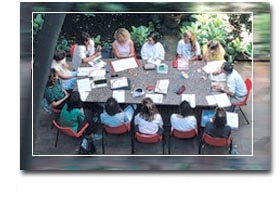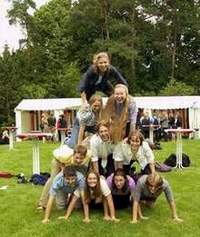(单词翻译:单击)
内容包括4各部分:
·Part 1 Self Introduction 自我介绍
·Part 2 Introducing Other People给别人做介绍
·Part 3 Finding Topics for Free Talks 寻找闲谈话题
·Part 4 Greeting and Saying Good-bye 打招呼和说再见
Part 1 Self Introduction 自我介绍
Dialogue Script 对话原文
Jean: Hi, my name is Jean Wilson.
Andy: Hi, I'm Andrew Mclane. Everybody calls me Andy.
Jean: Hello, Andy. I'm glad to meet you. You are in my class, aren't you?
Andy: Yes. My father knows your father.
Jean: Really? We've only been here for a short time. I don't know many people yet.
Andy: It's hard to meet people in a new place. Would you like to come to the café with me? Everybody goes there after school. They've ice cream and things to drink. You can meet some of the other people in our class.
Jean: I'd like to, Andy, but I've got to mail these letters. Maybe later.
Andy: Let's all right. Bye!
Jean: Bye-bye!
讲解:
恰当的自我介绍对自己很重要,会给别人留下良好的第一印象。做介绍时一定要面带微笑。刚开始的时候通常是连名带姓将自己的全名(full name)直接说出。
当然,如果在不是非常正式的场合,如在朋友家里聚会的时候,气氛比较 轻松,则可以只报出自己的名字(given name或 first name)。比如说:I'm Tony. My name is Monica.
轻松,则可以只报出自己的名字(given name或 first name)。比如说:I'm Tony. My name is Monica.
有时为了向别人表示更友善、亲切,还可以告诉对方自己的小名,昵称等等。如对话中,Andrew Mclane就说everybody calls me Andy.每个人都叫我Andy,言外之意就是你也可以叫他Andy。还可以直接说Just call me Andy.就叫我Andy好了。
英美国家的人往往喜欢用名字的简略形式,比如说对话中的Andy就是Andrew的简略形式,还有把Jennifer叫做 Jenny,把 Christopher 叫做Chris, Edward叫做 Ed;有的名字的简略形式用的是这个名字的其他部分,比如 Anthony 就叫Tony 。另外一些简略形式却和原来的名字字面上看一点关系都没有。比如说美国前总统,大家都知道是Bill Clinton。其实Bill是他的小名,William才是他的大名。类似的还有Jack是John 这个名字的小名。如果你不知道某些名字的小名没有关系,最安全的办法就是先观察别人是怎么用的,你再跟着用。
另外,在工作场合,人们在做自我介绍时经常会在自己的姓之前加上自己的职称,头衔等等。比如说:医生在诊所里会见病人时,会这样打招呼,Hi,I'm Doctor Smith.我是史密斯医生。课堂里教授会说I'm Professor Brown. 我是布朗教授。但是千万不要说I'm Teacher Brown. 我是布朗老师, 这是中国人普遍犯的错误. 因为teacher是一种职业而不是一种称谓。 正确的说法是I'm Mr. Brown或者是 I'm Ms. /Mrs. Brown. 军人则会说 I'm Major White.我是怀特少校。
当然,英美人和中国人也有相同的地方,就是见面时要互相握手。握手的时候要有力但是别把对方握痛了,同时要看着对方的眼睛。大约持续三秒,只晃两三下,注意不要一直握着对方的手不放,这样很讨人厌。
自我介绍的一些常用基本表达方式:
比较正式的用法:
May I introduce myself? I'm David Marks.或者是My name is David Marks.
Let me introduce myself. My name is David Parker.
It's nice to meet you. Allow me to introduce myself.
May I have your name?
May I ask your name?
非正式的用法:
Hello, I'm Henry Jackson.
How do you do? I don't think we've met before. My name is Jack Lindon. I'm from England.
回答: Nice to meet you. /It's a pleasure to meet you./Glad to meet you.等等。
Part 2 Introducing Other People 给别人做介绍
Dialogue Script 1 对话原文 1
Frank: Mr. Smith, I'd like you to meet my friend Lisa Peterson.
Smith: How do you do?
Lisa: How do you do?
Smith: How do you find things over here?
Lisa: If it wasn't for the climate, I'd like it very much.
Smith: It won't take you too long to settle here.
讲解:
在这段对话中,Lisa Peterson被介绍给了Mr.Smith,他们两个互道寒暄之后,又聊了一些题外话,介绍别人时的模式大体就是这样的。
注意介绍人要给被介绍人充分的时间去交流。
Dialogue Script 2 对话原文 2
Peter: May I introduce my new associate, Sarah Jackson? She represents the Dragon River Wear Company in China. This is Jay Mayor, a buyer for Bloomingdale's.
Sarah: Pleased to meet you, Mr. Mayor.
Mayor: Pleasure's mine. How is it going in China? Do you like it there? 
Sarah: Quite good. The climate is pleasing and the food is great.
讲解:
这段对话发生的背景显然是一个商业酒会,说法都比较正式。介绍人把双方都介绍了一下,包括他们的职业。但是注意不要说的太多,因为第一次见面大都不会谈的太深入。
给别人作介绍的常用基本表达方式:
比较正式的表达方式:
I'd like you to meet Mr. Smith.
I'd like to introduce Mrs. Linda Simpson.
May I introduce Mr. David Parker?
Allow me to introduce my friend Peter Brown. Peter, this is Mr. Howard Smith.
Allow me to introduce you to my manager.
Mr. Smith, let me introduce Mr. John Peterson.
比较随意的表达方式:
Meet my friend Peter Brown.
Mr. Smith, this is Mr. Brown.
Jack, this is Miranda. Miranda, this is Jack.
回答就与做自我介绍时差不多,双方要互相问候。
另外,在做具体介绍的时候,应该平举右手掌示意,而且眼神、手势要投向被介绍者,不要用手指,这样会显得不尊敬。
Part 3 Finding Topics for Free Talks 寻找闲谈话题
Dialogue Script 1 对话原文 1
Peter: Excuse me, is anybody sitting here?
Anne: No...no, here, let me move my purse from the chair.
Peter: Oh, thank you. Say, haven't I seen you with Jack Davidson?
Anne: I work with Jack Davidson. How do you know Jack?
Peter: Jack and I went to the same college. What sort of work do you do?
Anne: I work on commercial accounts at the trust company with Jack. Um...what do you do?
Peter: I'm a telephone installer. I just happen to be working on this street the last couple of days. I should introduce myself, my name is Peter Spencer.
Anne: Well, nice to meet you! I'm Anne Kennedy.
Peter: Glad to know you. Do you live around here?
Anne: Yeah, I live in the neighborhood-it's really convenient for work.
Peter: Oh, it sounds like it. ... By the way, are you doing anything tonight?
Anne: Uh, sorry, I'm afraid I'm busy tonight.
Peter: Well, how about tomorrow? Maybe we could go to a movie.
Anne: That sounds like a great idea. Um...do you like comedies?
Peter: Yeah, I like comedies, let's see, what could we see? How about "Someone like it hot"? I think that's playing over at...
Anne: Ah...
Peter: ...on Main Street here.
Anne: That's a great idea.
Peter: Well, I guess we should meet about eight o'clock then, because I think the movie starts about eight-thirty. Where would be a good place to meet?
Anne: There's a clock tower near the movie theater. We could meet there at about eight.
Peter: OK, that sounds good. see you tomorrow, then.
Anne: I'll see you then, bye-bye!
Peter: Bye!
讲解:
在双方做自我介绍时,如果对方在说名字时附加了其他信息, 你就可以把这些信息作为接下来谈话的话题,比如有人说他去参加过滑雪比赛,或者他的家乡你也去过等等,凡是你觉得能有发挥空间的话题,都可以和对方聊。如果实在找不到的话,你可以试探着问对方问题,即使得不到肯定回答,一般情况下对方也会告诉你他的他对这个问题的意见和想法,这样不就可以展开话题了嘛。
你就可以把这些信息作为接下来谈话的话题,比如有人说他去参加过滑雪比赛,或者他的家乡你也去过等等,凡是你觉得能有发挥空间的话题,都可以和对方聊。如果实在找不到的话,你可以试探着问对方问题,即使得不到肯定回答,一般情况下对方也会告诉你他的他对这个问题的意见和想法,这样不就可以展开话题了嘛。
寻找闲聊话题时常用的一些表达:
Nice day, isn't it?
Horrible weather we're having.
Excuse me, is anybody sitting here?
Say, have we met somewhere before?
Sorry, I couldn't help overhearing-did you mention something about Michael Jordon?
Excuse me, have you got a light?
Uh, I'm looking for a present for my wife, could you help me?
大家可能发现了,几乎我们身边所有的事物都可以那过来打开话题,就是break the ice,只要大家仔细观察,眼观六路,耳听八方,就不愁找不到话题。
Dialogue Script 2 对话原文 2
Wayne: What's the weather like in your country?
Anna: It's very humid. It rains nine months of the year.
Wayne: My country is arid. We have very little rain. But when it rains, we have terrible thunderstorms and sometimes hurricanes.
Anna: The temperature at home is mild most of the time, except in winter, when for a few months it becomes severely cold.
Wayne: Oh, it's hot during the day in my country and just a little cooler at night all year long.
Anna: Well, I guess you never have snow storms, then.
Wayne: Yes, you're right. We have dust storms in the early spring and late fall. It never gets enough cold to snow, though.
Anna: Last year, we had a blizzard. It snowed for five days. That is the worst snowstorm in our history.
Wayne: I read it in the newspaper. It said that the snow turned to hail and later this turned to sleet.
Anna: Yes, the hailstones were large enough to break glass.
Wayne: I'm glad I live in a milder climate, where we have showers and rain instead of snow and sleet.
Anna: But, still you have dust storms and hurricanes!
Wayne: Oh, well. Every part of the world has weather problems, I guess.
讲解:
其实英美国家的人很少为了谈天气而谈论天气,陌生人在一起的时候,比如在火车上,地铁上,侯机厅里等等,为了摆脱彼此间面面相觑的尴尬,为了活跃气氛,大家会不约而同的谈论天气,这样就可以自然地引出许多其他的话题。
好天气的说法:
Lovely day, isn't it?
Isn't it beautiful?
The sun is shining!
Isn't it gorgeous?
Wonderful, isn't it?
It's so nice and hot!
Personally, I think its so nice when it's hot-isn't it?
I adore it, don't you?
糟糕的天气:
Nasty day, isn't it?
Isn't it dreadful?
The rain again...I hate rain.
I don't like it at all.
Fancy such a day in July. Rain in the morning, then a bit of sunshine, and then rain, rain, rain all day along.
补充:
What's the weather like today?
今天天气怎么样?
How cold is it today?
今天有多冷?
Is the weather usually like this here?
这里的天气通常都像这个样子吗?
What's it like in sring/summer/fall/winter?
春天呢?/夏天呢?/秋天呢?/冬天呢?
The wind is dying now.
风渐渐停了。
What a downpour!
雨下得真大!
It looks as if there will be a storm soon.
看来不久会有暴风雨。
It's a bit windy, isn't it?
是不是有点起风了?
It's been looking like rain for several days.
这几天一直像要下雨的样子。
It was warm and sticky last week.
上个礼拜又热又潮。
We are going to have a cold spell, I hear.
听说寒流要来了。
I wouldn't be surprised if it rained tomorrow.
我觉得明天可能会下雨。
It's been raining on and off all morning.
雨断断续续地下了一早上。
The sky is getting very cloudy.
天空的云越聚越多了。
The clouds are building up.
云渐渐多了。
So winter is coming early this year.
今年的冬天来的真早啊。
The rain season is getting me down.
雨季让我无精打采。
It's a shame to stay indoors on such a fine day.
这么好的天气呆在屋里太可惜了。
Tomorrow's high will be 16 centigrades, and low 12 centigrades.
明天最高气温摄氏16度,最低摄氏12度。
The winter is going.
冬天快过去了。
Does it rain often here?
这经常下雨吗?
It will be from overcast to cloudy today.
明天阴转多云。
It's breezy and pleasant today.
今日凉风习习,非常舒适。
It's clearing up.
天要晴了。
The temperature has dropped a lot today.
今天气温下降了不少。
The temperature has climbed to 35 centigrades.
气温上升到35度了。
It's quite different from the forecast.
天气预报说得差远了。
It was cloudy in the morning, but it turned out to be a nice day after lunch.
早上天气阴沉,但是午饭后就晴朗起来。
Part 4 Greeting and Saying Good-bye 打招呼和说再见
Dialogue Script 1 对话原文 1
Anna: Hi, Wayne, haven't see you for a while. What have you been doing?
Wayne: Not much. Actually, I've had my head in the books for the last month or so. I've been studying for my mid-semester exams.
Anna: Really? You don't seem to be doing much at the moment.
Wayne: No. I've been reading books in the library all morning, so I just decided to have a break and check my e-mail on one of those computers.
Anna: I'm not very good with computer myself. I have trouble even doing simple word processing.
Wayne: Hmmm. I did one unit of computer studies in my first year at university so I don't find it difficult at all.
Anna: Speaking of difficulty, I hear that you want to study radio broadcasting this semester.
Wayne: Well, no. I did enroll in radio at the beginning of the year, but I changed my mind, now I want to study photo-journalism instead. Actually, I have to got to the communications and media studies department to change my enrollment.
Anna: When are you going to go, today?
Wayne: Yes, well, I'd better go now.
Anna: Would you like a lift? I'm going to the campus myself.
Wayne: OK! Thank you!
讲解:
恰当的招呼问候能活跃气氛,增进友谊。中国人常见的问候语象“你吃了吗?”“你上哪去?”等等,其实现在也不是很常用了,在英语里就不适用。用英语打招呼,首先要区分是熟人还是不熟的人,遇见熟人说句:How are you?,有时间的话也可以多聊一些,像刚才的对话中,两个人就聊起了学习方面的事。如果遇见不太熟的人,说一句"hi""hello"就足够了。
另外还要注意一般不要打探人家的隐私。一般情况下,大家都是谈论关于兴趣、爱好、旅游、共同认识的朋友、工作啊等等。有时候我们还用身势语和人打招呼,比如点头微笑。
见面后大家谈论的话题、内容都要依据对方的兴趣、爱好等等, 不能见什么人什么都说,所谓“人逢知己千杯少,话不投机半句多”,就是这个道理。
不能见什么人什么都说,所谓“人逢知己千杯少,话不投机半句多”,就是这个道理。
问候的常见表达方式:
What's new? –nothing special.
How are you doing?
How's everything going?
How are you getting on these days?
How are things going with you?
Hello there, what a coincidence!
Haven't seen you for ages.
It's a small world, isn't it?
回答的表达方式:
I'm doing ok, thank you.
Can't explain.
All right, thank you.
Pretty good, thank you.
Things couldn't be better.
Not bad!等等
再见的一些说法
Take care, bye!
Cheerio!
See you later!
Bye! Keep in touch!
Byebye!
So long!
下面这几句虽然没有明显的标记,但是弦外之音都是要结束对话了,这时你就不要再说个没完了。
It's been very nice talking to you.
Remember me to your family.
Send my regards to your family.
Hope to see you again at the next science fair.
Remember to drop me a line!


